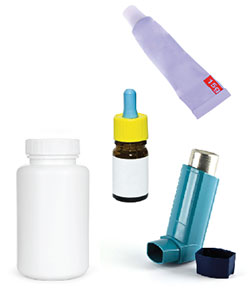Using Your Own Medications While in Hospital
2018-04-25
When you are staying in a hospital, the hospital pharmacy will supply any medications that you need. Sometimes, though, the hospital may not have all the medications that you take at home. In these cases, you may be asked to bring your own supply from home. It's important that you do not use any medications on your own, unless you've talked to your doctor, nurse, or pharmacist at the hospital.
SafeMedicationUse.ca received a report about parents who brought an over-the-counter pain cream to the hospital to apply to their child's burns. The pain cream had not been prescribed by the doctor at the hospital and was not checked by a pharmacist before it was used. The cream was applied to the burns during a dressing change. Unfortunately, the child's damaged skin allowed too much of the pain medication in the cream to be absorbed, and the child had a seizure.
-

SafeMedicationUse.ca has the following advice for consumers to help prevent mistakes with medications brought from home while in the hospital:
-
If you are going to the hospital, bring all of your medications with you, including prescription, nonprescription, and natural health products. Having the medications on hand will help you tell your healthcare providers about the products you have been using at home.
-
While you are in the hospital, keep only those medications that the doctor, nurse, or pharmacist have told you to keep. Send all other medications home with your family or caregiver after they have been reviewed by a healthcare provider.
-
While you are in the hospital, do not take or use any medications on your own. Wait for instructions from a healthcare provider.
-
Some medications from home may be stopped while you are in the hospital, or the doses may be changed. Don't be afraid to ask your healthcare provider to explain any medication changes.
Read some additional tips about how Medication Reconciliation Can Help to Reduce the Chance of Errors with Medicines!
Be sure to talk to your healthcare provider about the 5 Questions to Ask about Your Medications.
Medication safety bulletins contribute to Global Patient Safety Alerts
This newsletter was developed in collaboration with Best Medicines Coalition and Patients for Patient Safety Canada.
Recommendations are shared with healthcare providers, through the ISMP Canada Safety Bulletin, so that changes can be made together.
|

